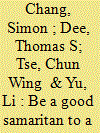| Srl | Item |
| 1 |
ID:
149759


|
|
|
|
|
| Summary/Abstract |
We conducted a large-scale lost letter experiment in Beijing, a megacity with > 21 million residents, to test if the observed altruistic attribute of the letter recipient would induce more passersby to return the lost letters. The treatment letters were addressed to a nationally renowned charitable organization in China, while the control letters were intended to an invented individual. A total of 832 ready-to-be-posted letters were distributed in 208 communities across eight districts in the city. The overall return rate was 13%. Yet, the return rate of the treatment letters (17%) was nearly twice as high as that of the control letters (9%). The finding adds large-scale field experiment evidence in support of the other-regarding preferences theory. In addition, we also found that the lost letters were more likely to be returned if they were dropped in communities with a relatively higher income or a postal box located closer.
|
|
|
|
|
|
|
|
|
|
|
|
|
|
|
|
| 2 |
ID:
145886


|
|
|
|
|
| Summary/Abstract |
Using data from a 2011 national household survey, this study examines the factors shaping urban residents’ prejudice toward rural-to-urban migrants and the impacts of prejudice on rural migrants’ integration into urban communities. The author addresses the endogeneity of the prejudice variable by employing an instrumental variable method. The results show that urban residents with higher education and household income report stronger prejudice. Also, urban residents with urban hukou at birth are more prejudiced toward rural migrants. Given that hukou status at birth is tied to parental hukou status, this result implies that prejudice can be transferred across generations. With regards to rural migrants’ integration into urban communities, high levels of prejudice in one’s current county of residence reduces perceived social standing of rural migrants and increases the number of livelihood problems they encounter. The author also conducts a falsification test, which provides support that the effect of urban residents’ prejudice on rural migrants’ integration is causal.
|
|
|
|
|
|
|
|
|
|
|
|
|
|
|
|